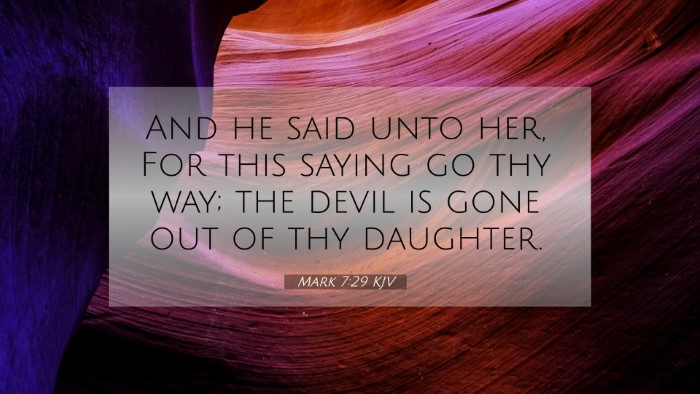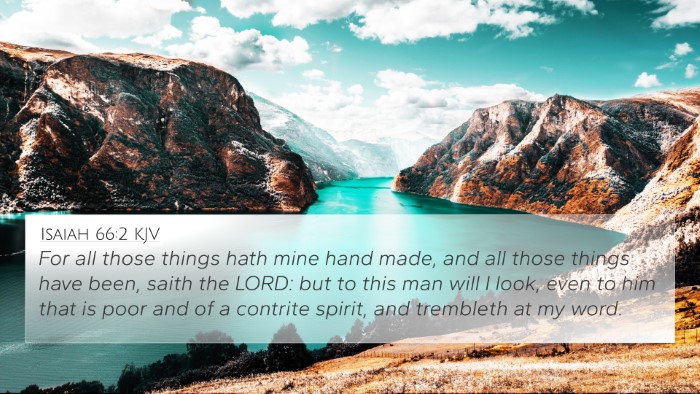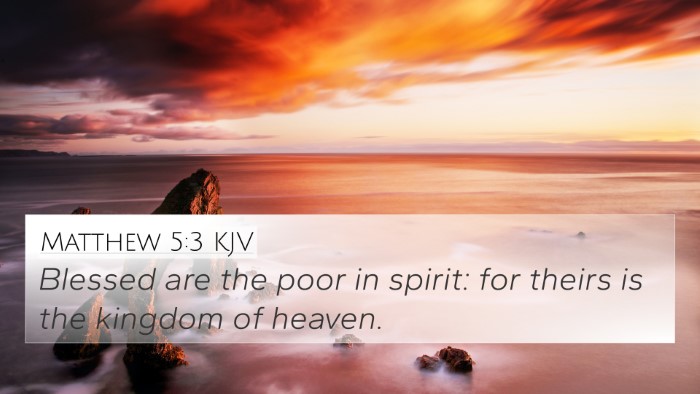Understanding Mark 7:29
Bible Verse: Mark 7:29 - "And he said to her, 'For this statement you may go your way; the demon has left your daughter.'"
Overview of the Verse
In Mark 7:29, Jesus acknowledges the mother's faith, affirming her request for healing on behalf of her daughter. This interaction illustrates the significance of faith and persistence in prayer, showcasing Jesus' authority over demonic forces. The verse is rich in meaning and connects profoundly with broader Biblical themes.
Commentary Insights
-
Matthew Henry:
Henry highlights the woman’s unwavering faith and humility as the keys that prompted Jesus’ response. He emphasizes that her belief, despite her background as a Gentile, reflects the inclusiveness of Christ’s healing power.
-
Albert Barnes:
Barnes notes that Jesus’ reply emphasizes the importance of the woman's statement, recognizing the power of faith. He points out that the casting out of the demon illustrates Christ's authority over evil, reinforcing the message that faith transcends cultural boundaries.
-
Adam Clarke:
Clarke elaborates on the significance of the miracle, stressing that the woman’s plea shows a remarkable understanding of Jesus’ power. He suggests that her request and Jesus’ affirmation serve as an example of how persistence in faith leads to divine action.
Key Themes and Connections
This verse encapsulates several themes central to Biblical teaching:
- Faith and Healing: The woman’s faith in Jesus’ ability to heal her daughter showcases the belief in Jesus’ miraculous powers.
- Inclusivity of Christ: The interaction illustrates that Jesus’ ministry extends beyond the Jewish people to Gentiles, indicating the universal scope of salvation.
- Authority Over Evil: The act of casting out a demon demonstrates Jesus' sovereignty and power over dark spiritual forces.
Bible Cross References
Mark 7:29 connects to numerous other Bible verses that illustrate related themes:
- Matthew 15:28: “Then Jesus answered her, 'O woman, great is your faith! Be it done for you as you desire.'”
- Luke 7:9: “When Jesus heard these things, he marveled at him, and turning to the crowd that followed him said, 'I tell you, not even in Israel have I found such faith.'”
- James 1:6: “But let him ask in faith, with no doubting, for the one who doubts is like a wave of the sea that is driven and tossed by the wind.”
- Mark 11:24: “Therefore I tell you, whatever you ask in prayer, believe that you have received it, and it will be yours.”
- John 14:13-14: “Whatever you ask in my name, this I will do, that the Father may be glorified in the Son.”
- Romans 10:12: “For there is no distinction between Jew and Greek; for the same Lord is Lord of all, bestowing his riches on all who call on him.”
- Psalm 30:2: “O Lord my God, I cried to you for help, and you have healed me.”
Thematic Bible Verse Connections
The connections within the phrase "the demon has left your daughter" resonate with similar phrases across the Bible that speak about healing, faith, and authority over evil:
- Matthew 8:16: “That evening they brought to him many who were oppressed by demons. And he cast out the spirits with a word and healed all who were sick.”
- Acts 16:18: “And this she kept doing for many days. Paul, having become greatly annoyed, turned and said to the spirit, 'I command you in the name of Jesus Christ to come out of her.' And it came out that very hour.”
Tools for Bible Cross-Referencing
Understanding cross-references is crucial for deeper Biblical study. Below are some tools to aid in analyzing connections in scripture:
- Bible Concordance
- Bible Cross-Reference Guide
- Cross-Reference Bible Study
- Bible Cross-Reference System
- Comprehensive Bible Cross-Reference Materials
Conclusion
Mark 7:29 serves as a powerful reminder of the importance of faith, the authority of Jesus Christ, and the inclusivity found within his message. By engaging in a comparative Bible verse analysis and employing Bible verse cross-references, believers are better positioned to grasp the richness of scripture and how it interconnects throughout the Biblical narrative. Understanding these connections enhances both personal faith and communal discussions.







